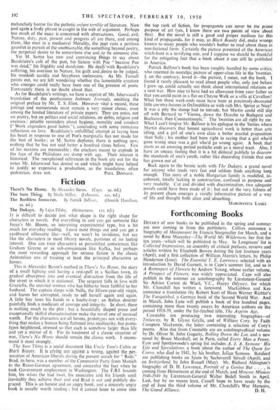Fiction
The Ruthless Innocent. By Patrick Balfour. (Hamish Hamilton. 93. 6d.) The Dukays. By Lajos Zilahy. (Heinemann. 12s. 6d.) IT is difficult to decide just what shape is the right shape for characters in novels. Put everything in and you get someone like Joyce's Mr. Bloom, an interesting experimental type, but a bit much for everyday reading. Leave most things out and you get a cardboard silhouette like—well, we won't be invidious, but say like the characters in most library novels, pastimes of no lasting interest. One can treat characters as personified consciences like Graham Greene or as sub-consciences like Kafka, but perhaps the most rewarding approach for serious fiction is the classic Aristotelian one of treating at least the principal characters as heroes.
This is Alexander Baron's method in There's No Home, the story of a small fighting unit having a rest-spell in a Sicilian town, its gradual absorption into and eventual distraction from the life of the street in which it is stationed. The sergeant falls in love with Graziella, the married woman who has hitherto been faithful to her husband. The captain sleeps with Nella, the fifteen-year-old virgin, and leaves her corrupted, ready to sell herself again and again. A little boy loses his hands in a booby-trap ; an Italian deserter painfully finds a modicum of courage and integrity. In short, there is nothing much to the plot ; but a beautifully shaped prose and exceptionally skilful characterisation make the novel one of unusual worth. For the characters are all heroes, prototypes not with every- thing that makes a human being flattened into mediocrity, but proto- types heightened, stressed so that each is somehow larger than life and yet a mirror of it. For its treatment of a classic situation of war, There's No Home should remain the classic work. I recom- mend it most strongly.
The Sure Thing is a social document like Uncle Tom's Cabin or Black Beauty. It is crying out against a wrong, against the per- secution of American liberals during the present search for " Reds." Brad, its hero, was a member of the Communist Party from Munich to the Russo-German agreement, and concealed the fact when he took Government employment in Washington. The F.B.I. hounds him, his wives (he had two), his associates and his friends until Inevitably they achieve their end and Brad is out and publicly dis- graced. This is an honest and an angry book, and a sincerely angry book is usually worth reading ; but it cannot hope to come into
the top rank of fiction, for propaganda can never be the prime purpose of art (yes, I know there are two points of view about this). But the novel is still a good and proper medium for this kind of propaganda, for it may, as Black Beauty did, make wrongs known to many people who wouldn't bother to read about them in non-fictional form. Certainly the picture presented of the American witch-hunt is a terrifying one, and I suppose we should be thankful for the mitigating fact that a •bbok about it can still be published in America.
Patrick Balfour's book has been roughly handled by some critics, who resented its nostalgic picture of upper-class life in the 'twenties. I, on the contrary, loved it—the picture, I mean, not the book. I found it rarely pleasant to read about people who, only just before I grew up, could actually not think about international relations or a next war. How nice to have had an allowance from your father so that you could paint in a flat on Cheyne Walk or a villa at Cavallon! What fun those week-ends must have been at preciously-decorated little corntry-houses in Oxfordshire or with rich Mrs. Sprint at Nice! It was a pity the slump had to intrude, but Martin could still slip off with Bernard to " Vienna, down the Danube to Budapest and Bucharest, then Constantinople." The 'twenties are all right by me. What I can't forgive Mr. Balfour is his epilogue in the 'forties where Martin discovers that honest agricultural work is better than arty idling, and a girl of one's own class a better marital proposition than Sally ; his mother had been right in saying that a girl who'd gone wrong once was a girl who'd go wrong again. A book that starts as an amusing period pastiche ends as a moral tract. Also, I have an uneasy feeling that it is a bit disloyal publicly to disavow the standards of one's youth, rather like discarding friends that one has grown out of.
Back again to the heroic scale with The Dukays, a grand novel for anyone who reads very fast and seldom finds anything long enough. This story of a noble Hungarian family is muddled, in- coherent, totally lacking in construction, confused in purpose and very readable. Cut and divided with discrimination, two adequate novels could have been made of it ; but out of the very fulness of its present chaos emerges a vividly informative picture of a way of life and thought both alien and absorbing.
MARGHANITA LASKI.


































 Previous page
Previous page